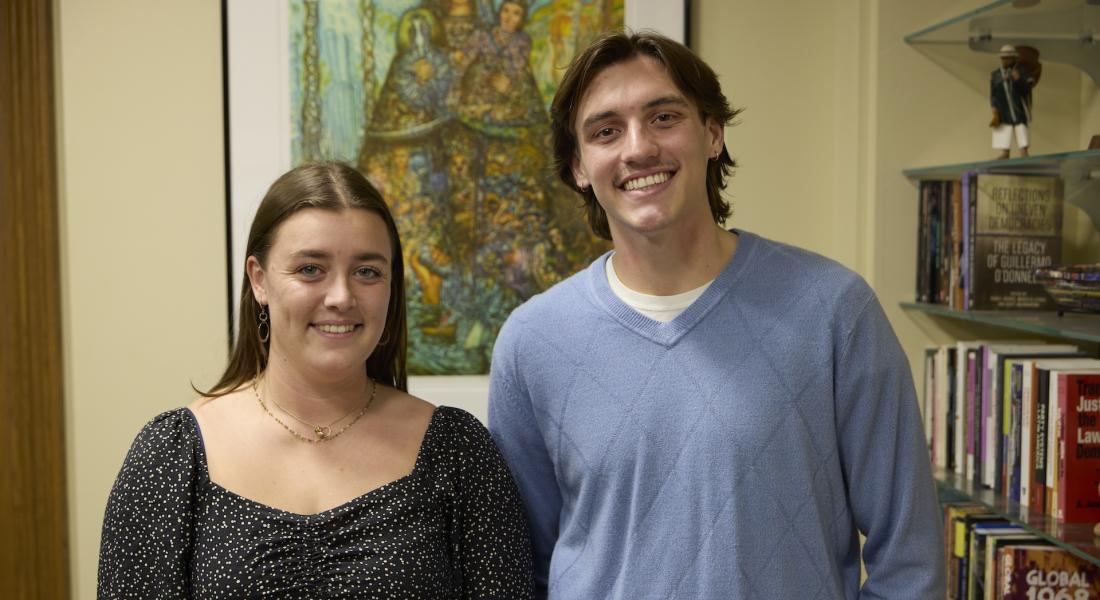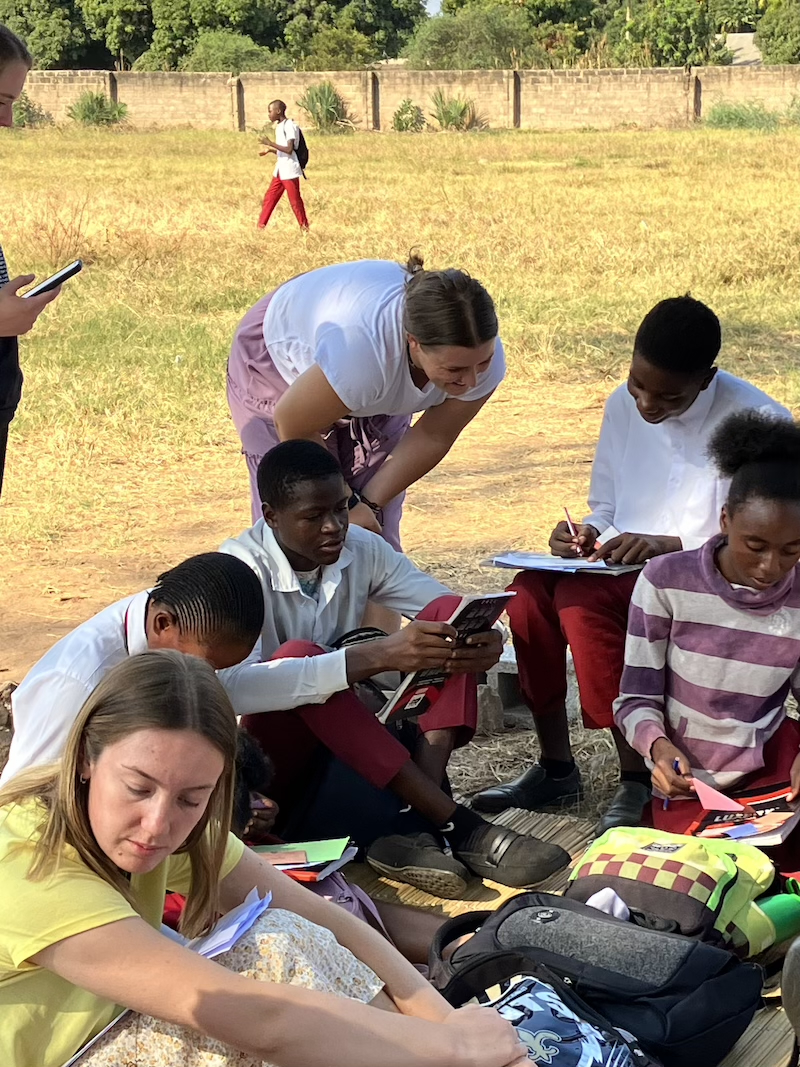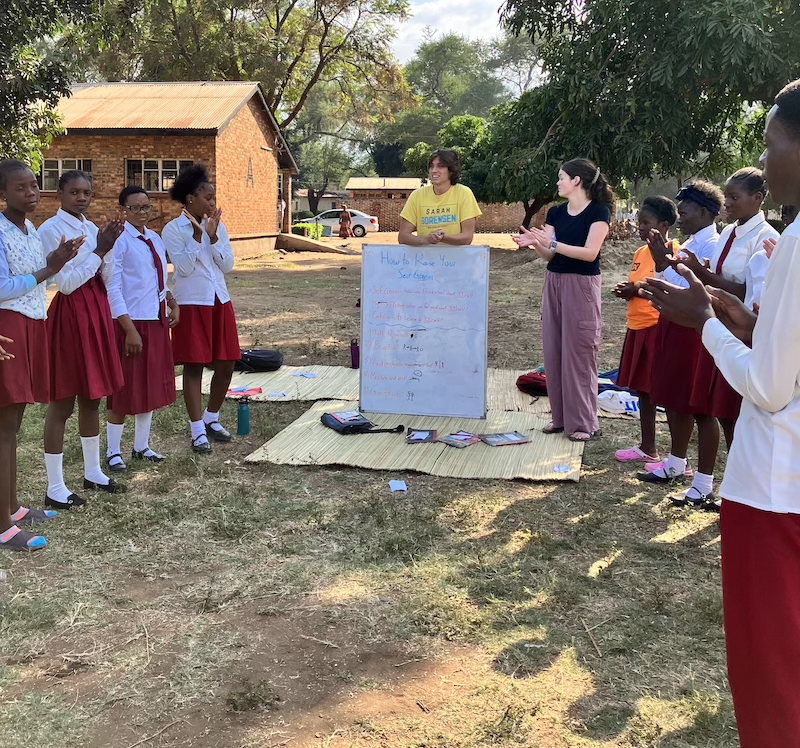
Keough School senior Sophia Rockwell came to an unexpected realization as her academic journey evolved. Engineering – whether aerospace and mechanical or civil – wasn’t the direction in which she was headed after all. She tried them, but environmental law and policy proved to be the disciplines that energize her and promise a future in which she can fight for environmental justice. She is now majoring in global affairs and environmental earth sciences.
“There is a personal call to action,” Rockwell said, when people become aware of the damage to our climate and its effects on health, safety, and other spheres. With support from the Kellogg Institute, part of the Keough School, she attended the 3rd International Conference on Environmental Peacebuilding in June at Leiden University in The Hague, Netherlands, as part of her work with the Kellogg Developing Researchers (KDR) program. She toured the International Criminal Court and met with climate leaders from the Global South.
 Rockwell also traveled to Zambia with the Kellogg Pre-Experiencing the World Fellowship (Pre-ETW) program, another initiative designed for undergraduates to try new opportunities that sometimes lead to surprising pathways.
Rockwell also traveled to Zambia with the Kellogg Pre-Experiencing the World Fellowship (Pre-ETW) program, another initiative designed for undergraduates to try new opportunities that sometimes lead to surprising pathways.
“Kellogg programs like KDR and Pre-ETW open up new possibilities for Notre Dame undergraduates. Through learning new skills, developing relationships with faculty members, connecting with Kellogg alumni, encountering the Global South personally – all these experiences can lead to so many other opportunities, often beyond what students even imagine for themselves,” said Kellogg Associate Director Holly Rivers, who launched these and other Kellogg undergraduate programs. “Kellogg programs help students forge new paths, going far beyond the internship-to-job trajectory many students might otherwise think of as standard.”
Rockwell was able to connect with Richard (Drew) Marcantonio, assistant professor of environment, peace and global affairs in the Keough School and a Kellogg faculty fellow. As his research assistant, she focuses on themes of environmental violence explored in his forthcoming book.
“I work on case studies and how to build a textbook for the topic, and how that should be translated for students,” Rockwell said. She also has edited business toolkits on how to advance environmental justice.
“Her winding journey has led her to enter a community of folks truly focused on, and experienced in, a multivalent, complex issue,” said Marcantonio. “Thinking about the relationship between the environment and conflict is tough. It's messy. It does not provide easy answers and rarely does it yield satisfactory solutions.” Yet Rockwell has embraced the work with a sense of wonder and hope, he said.
It’s what he calls the “backroom work” of a new direction that intrigues senior Benjamin Martin, too. Martin’s interests lie in Francophone Africa, including research travel to Côte d'Ivoire supported through Kellogg funding. Martin also traveled to Zambia through the Pre-Experiencing the World Fellowship program.
“It's not as easy to go off the beaten path but it's extremely rewarding,” said Martin, a political science major with minors including French, an integral skill as he pursues a career in research and academia. He’s interested in the soft power of linguistics and how language acquisition influences political views. That’s meant a departure from seeking a traditional corporate post-internship return offer at graduation.
“It might have made more sense to go to Capitol Hill, to a law firm or a lobbying firm,” said Martin, noting that many Notre Dame peers are “super secure” in the plans they choose after graduation. “But I don't think that I would have ever found any of my areas of interest without alternative experiences. The personal growth is remarkable.”
As a developing researcher, Martin has emerged as a leader who shares insights and skills with students who may be seeing themselves in a research context for the first time. “It's been nice to be able to give back in a sense, because Kellogg has given me so much support in the past few years,” he added.
For Rivers, the capacity to assist students who want to follow an alternative vision is as critical to the Kellogg mission as the institute’s other metrics of success.
“We can tell you to do this, then that, in order to forge your identity and career,” said Rivers, “but then college loses its value as an opportunity to expand and explore. There’s no one-size formula that fits all, and that’s not the way the real world works anyway.”
Martin plans graduate study, preferably in France, and feels his journeys to the African continent have informed his decisions. Rockwell isn’t yet sure how she will apply her environmental education and interests, again because there are many pathways. Law school is likely, but Peace Corps is possible, too.
“The opportunities have a snowball effect,” Rockwell said. “Take that first leap and you find that something daunting becomes awesome. Kellogg really affirms this with trust in the students to lead these paths.”
The Kellogg Institute for International Studies, part of the Keough School of Global Affairs at the University of Notre Dame, is an interdisciplinary community of scholars and students from across the University and around the globe that promotes research, provides educational opportunities, and builds partnerships throughout the world on the themes of global democracy and integral human development.





